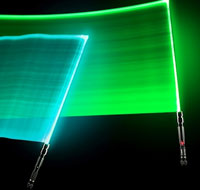Reply To:
Name - Reply Comment
 In journalism, there's something called a lede, which is just another word for the main or most important part of your story. Normally you want to lay it out for the reader in the first sentence or two. Obviously, I'm hesitating here.
In journalism, there's something called a lede, which is just another word for the main or most important part of your story. Normally you want to lay it out for the reader in the first sentence or two. Obviously, I'm hesitating here.
That's because I can't decide if it's more important that researchers at MIT and Harvard have just managed to create a previously unobserved form of matter by getting photons to bind together into molecules, or the fact that the result is basically a real-life lightsaber -- that could be part of a quantum computer one day.
Actually, I think what this story is really about is...friendship.
See, photons -- which are the elementary particles of light -- tend to be massless and kind of aloof. If you shoot two laser beams at each other, the photons just pass right through each other without so much as a hello or a high five.
But when the researchers fired a few photons into a vacuum chamber with a cloud of extremely cold rubidium atoms to take advantage of an effect called a Rydberg blockade, the photons started hanging out and even left the chamber together as the first "photonic molecule" -- a sort of quantum bromance -- ever observed.
And it's that bond between new particle bros that creates the new form of matter, which bears a resemblance to that most awesome weapon from a galaxy far, far away.
"It's not an in-apt analogy to compare this to lightsabers," said Harvard Professor of Physics Mikhail Lukin in a news release. "When these photons interact with each other, they're pushing against and deflect each other. The physics of what's happening in these molecules is similar to what we see in the movies."
Proof that friendship is possible at the particle level.
The team made no mention of the potential for weaponizing the new molecules to take on any Sith lords, but I suppose DARPA or any number of Jedi masters who follow Crave could come calling at any moment.
Photonic molecules would be more likely to advance quantum computing, according to Lukin: "Photons remain the best possible means to carry quantum information. The handicap, though, has been that photons don't interact with each other."
Until now. Turns out you just had to get some photons in the same place and introduce them to each other through some totally chill atoms, and they'll actually hit it off.
Lukin says this new bond between photons could also have practical applications for contemporary chipmakers working to convert light into electric signals.
Most mind-blowing of all, he also suggests the breakthrough could one day lead to technologies that allow for the creation of complex 3D structures, like crystals, made out of light.
Dude, these Cambridge smarties didn't just make "Star Wars" real, they've brought "TRON" to life at the same time! All because of the power of friendship ... and science!
(Source : news.cnet.com)